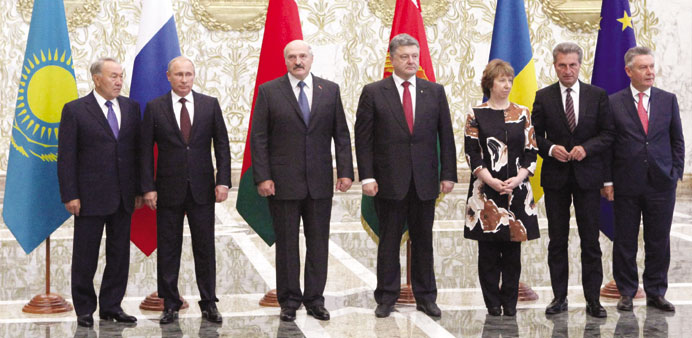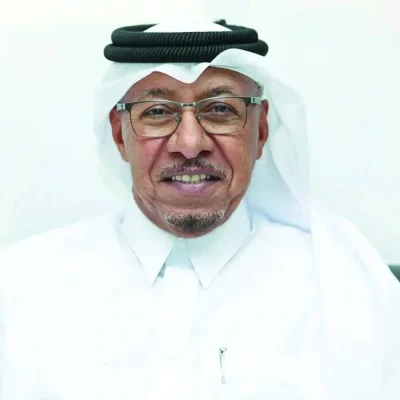Kazakhstan’s President Nursultan Nazarbayev (far left) with Russian President Vladimir Putin, Belarussian President Alexander Lukashenko, Ukrainian President Petro Poroshenko, High Representative of the European Union for Foreign Affairs and Security Policy Catherine Ashton, European Commissioner for Energy Guenther Oettinger, European Commissioner for Trade Karel De Gucht during a summit in Minsk, Belarus, this week. As a responsible partner in the global policy, Kazakhstan is making all efforts to counter new challenges and threats while offering its vision of solution to urgent regional issues.
For each country the adoption of its main law has particular importance. Nineteen years ago, on August 30, 1995, the people of the newly-independent former Soviet state of Kazakhstan voted for a new central governing document in a referendum.
After more than a month of intense public discussion, the foundation was set for the new nation to emerge with previously unheard of freedoms and stronger institutions which unleashed the young nation’s potential and paved the way for its dynamic development.
This document has a historic importance to our state, it guarantees the fundamental rights and freedoms, has become the basis for the development of the country’s economy, politics, culture and social sphere.
The new fundamental law has absorbed the best international experience of constitutional development of states on various stages of development. Its adoption has become a turning point in the history of our country.
The Basic Law has laid the foundation for the positive processes of development and strengthening of government institutions and society, provided the necessary conditions for Kazakhstan’s dynamic development of economic, social and cultural potential.
The Constitution established a high standard for democratic reforms in state and society and opened new possibilities for the implementation of individuals and establishment of a civilised market.
At the same time, Kazakhstan’s fundamental law was not out of social development, its updating happened periodically. In 1998, several articles of the Constitution were amended.
For example, the institution of elections under party lists was established. The process of shifting the centre of gravity from the president to parliament has been started.
The basis for subsequent implementation of the consideration of criminal cases by jury has been laid. This has been successfully used in Kazakhstan in recent years.
In accordance with the amendments, introduced to the Basic law in 2007, Kazakhstan became a unitary state with a presidential-parliamentary form of government.
As was noted by President Nursultan Nazarbayev, “the Constitution approved the solidarity of the people, united on the Kazakhstan land the citizens of all ethnic groups, linked by the common historical destiny. Born by the single nation-wide will, it became a creative basis for the development of the country”.
The 1995 Constitution has played a crucial role in the country’s history, it defined its destiny and every aspect of the country’s development.
For instance, the first article of the Constitution states that Kazakhstan is a democratic, secular, legal and social state whose highest values lie with the individual, his life, his rights and freedoms.
Kazakhstan was proclaimed a unitary state with a presidential-parliamentary form of government. The new constitution encourages the development of democratic institutions, the changes that were introduced in 1988 and in 2007 increased the capacity of the Basic Law.
The Constitution drafted in 1995 introduced new institutions and norms such as the bicameral structure of the national parliament, consisting of the Senate and the Majilis, a Constitutional Council, a hierarchy of sources of existing law, a unified court system, a new procedure for their formation, ensuring an independent judiciary branch.
The widely-recognised, politically stable and institutionally strong Kazakhstan is the direct result of this Constitution.
The Republic of Kazakhstan is rather a young country. Almost 23 years ago, on December 16, 1991 Kazakhstan declared its independence by adopting a law on state sovereignty.
Today, after the passage of two decades, we can confidently say that Kazakhstan has become a successful sovereign state and an equal partner in the global community.
After gaining its independence, Kazakhstan had faced the whole complex of problems that required immediate solutions. All of them have now been resolved.
In a short period of time Kazakhstan had completed the process of delimitation of borders with all neighbouring countries.
The country’s economy is developing with an accelerated pace, its citizens’ well-being is growing. New industrial facilities are being implemented and new jobs created.
During the years of independence, Kazakhstan’s GDP increased 17 times and is now over $12,000 per capita.
During these years the country attracted more than $180bn of foreign investments, which is about 80% of funds raised in the economies of whole Central Asia.
The country has successfully coped with the effects of the global financial crisis.
Year by year, spending on education and health steadily increases. Over the past 10 years it has grown more than eight times.
A unified network of intellectual schools is created throughout the country. A new Nazarbayev university has been opened in Astana.
Kazakhstan today has not only proven itself as a successful state but has also become an influential regional power, making a worthy contribution to global security and co-operation.
All this is a brilliant result of extraordinary activity of President Nazarbayev - the architect and builder of the new Kazakhstan, convincing evidence of his recognition as a truly global leader, who provides strategically the right path of development.
As a responsible partner in the global policy, Kazakhstan is making all efforts to counter new challenges and threats while offering its vision of solution to urgent regional issues.
In 1992, President Nazarbayev put forward the idea of the Conference on Interaction and Confidence-Building Measures in Asia (CICA) which brings together 22 states, which occupy 90% of Asia and half the population of the planet, and is a dynamic forum for security and co-operation.
Convincing evidence of increasing authority of Kazakhstan in the international arena is a successful and effective OSCE chairmanship in 2010, presidency in the Shanghai Co-operation Organisation in 2011, as well as the chairmanship in the Organisation of Islamic Co-operation in 2011-2012.
It is also a recognition of the impressive successes of Kazakhstan in socio-economic and political development since its independence.
The Republic of Kazakhstan is a reliable partner, the initiator and conductor of global solutions on ensuring the global security and dialogue of civilisations.
August 29 was declared as the International Day of Actions against nuclear testing by the United Nations. On this day in 1991 the Kazakhstan president had closed the nuclear testing ground in Semipalatinsk.
For the people of Kazakhstan, who had experienced all the horrors of nuclear weapons testing, the question of their total ban is particularly significant. During 40 years, 450 tests, which affected half a million people, were carried out at the Semipalatinsk test site.
Kazakhstan gave up the fourth largest nuclear arsenal in the world and forever closed the nuclear test site. During his visit to Kazakhstan and Semipalatinsk nuclear test site in April 2010, UN Secretary General Ban Ki-moon urged the leaders of all countries, especially the nuclear powers, to follow the example of Kazakhstan on disarmament and nonproliferation.
Speaking about the relations between Kazakhstan and Qatar, I would like to stress that Kazakhstan and Qatar enjoy long-standing traditional relations of peace and friendship.
Qatar is an important partner of Kazakhstan in the region. A high level of interaction in all spheres of bilateral co-operation have been reached in the relations between our two countries under the guidance of their leaders.
In conclusion, I would like to take this opportunity to congratulate my countrymen here in Qatar with our national holiday and wish our young and beautiful state all the success and new achievements.
*Azamat Berdibay is ambassador extraordinary and plenipotentiary of Kazakhstan to Qatar.



